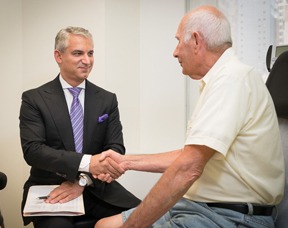Benign (noncancerous) enlargement of the prostate, known as benign prostatic hyperplasia (BPH for short), is the most common prostate related problem in men. Nearly all men will develop a degree of enlargement of the prostate as they age. By age 60, 50% of men will begin to exhibit signs of BPH. By the age of 85, 90% of all men will have signs of the condition. About one third of these men will develop symptoms that will require treatment.
Two of the main risk factors for BPH are advancing age and family history of the disease, neither of which can be changed.
That’s why some very healthy men end up getting the disease while some unhealthy men do not. However there are some things you can do to reduce your chances of getting BPH. There are steps you can take to minimize and eliminate your symptoms. If you are currently in the active surveillance stage and your symptoms are mild to moderate, there are a few things you can do to help ensure your BPH will not progress to a point that will require medical treatment.
Tips for relieving symptoms of BPH
- Some men who are nervous and tense urinate more frequently. Reduce stress by exercising regularly and practicing relaxation techniques such as meditation.
- When you go to the bathroom, take the time to empty your bladder completely. This will reduce the need for subsequent trips to the toilet.
- Talk with your doctor about all prescription and over-the-counter medications you’re taking; some may contribute to the problem. Your doctor may be able to adjust dosages or change your schedule for taking these drugs, or they may prescribe different medications that cause fewer urinary problems.
- Avoid drinking fluids in the evening, particularly caffeinated and alcoholic beverages. Both can affect the muscle tone of the bladder, and both stimulate the kidneys to produce urine, leading to nighttime urination.
In addition to these tips, you may also want to consider the use of saw palmetto. Use of the herb has shown promise as a treatment for BPH in some men. While the exact mechanism of action is unknown, it’s theorized that the extract from saw palmetto berries appears to block the formation of DHT, the hormone responsible for prostate gland growth. However, studies into saw palmetto have shown inconsistent results. As of yet the Food and Drug Administration (FDA) hasn’t approved any herbal medications for the treatment of an enlarged prostate.
When to seek medical care for BPH
If you are experiencing any urinary problems, be sure to discuss them with your doctor. Even if you don’t necessarily find the symptoms to be bothersome, it’s important to identify or rule out any underlying causes. Left untreated, urinary problems could potentially lead to obstruction of the urinary tract.


